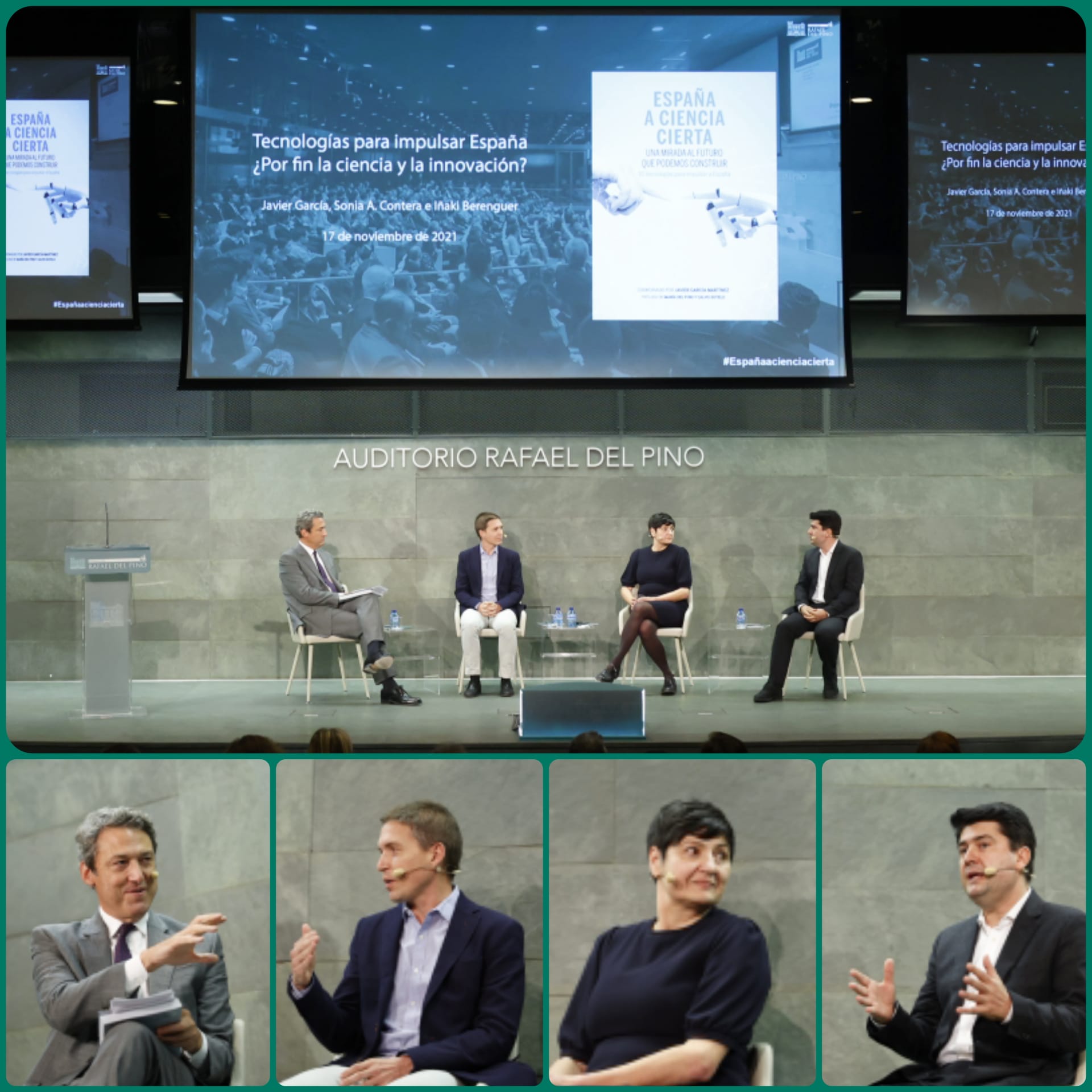
The key to the INTEC 2021 report, the result of a year's work by the Rafael del Pino Foundation's Chair in Science and Society, lies in the transformative power of technologies. Their capacity to move towards a more competitive and resilient production system is also evident throughout the 376 pages of the book. Spain for certainpublished by the Gestión 2000 imprint of Grupo Planeta.
Spanish nanotechnologist Sonia Contera, Associate Head of the Department of Physics at Oxford University, was in charge of the event's keynote address. Together with the author, Javier García, and the speaker, the director of the Rafael del Pino Foundation, Vicente Montes, and the entrepreneur, investor and co-founder of CoverWallet, Iñaki Berenguer, took part in the presentation.
The starting point of the Chair's report and of the Spain for certain is an examination of the Spanish productive system, with its strengths and opportunities. The approach is based on the technological sectors and the changes in trends in the new ways of producing and consuming. The result is a decalogue that combines prospective analysis and scientific and technological rigour. Telemedicine, photonics, new processes for hydrogen generation, neurosciences, mathematics for data processing, augmented reality, rapid testing, supercomputing, precision agriculture and nanomedicine.
The vision of Javier García and the team he leads is systemic and is part of the fourth industrial revolution. Each of the selected technologies has the capacity to significantly improve the competitiveness of companies and move them towards a circular, more sustainable and resilient economy. But also more focused on people, their health and well-being. However, to reach their full potential, they need to be applied as a whole, as they support and complement each other.
This approach makes Spain for Certain a reference work at a time marked by the necessary optimisation of European funds and the creation of quality employment. It also represents a solid contribution to guide decision-making in the face of the challenges Spain will face in the coming years.
From the "Science Pact" to the "Plan for Science
"If we use European funds to buy technologies developed by others, we will never get out of the position of dependence and weakness that characterises our economy. If, on the other hand, we use these funds to develop and implement the technologies described here, we will be able to build a knowledge economy. A model that will allow us to escape from the spiral of unemployment, precariousness and low competitiveness that has characterised our productive system for decades," says Javier García Martínez, professor and coordinator of the book.
"It is urgent to move from the 'Pact for Science' to the 'Plan for Science'. By now, no one disputes that science is important for the future of our country. Reaching a consensus on this point is easy. The difficult part is to build a shared and inspiring plan that moves people to action", adds the president of the International Union of Pure and Applied Chemistry, president of the Young Academy of Spain and professor of inorganic chemistry at the University of Alicante.
Experts and equipment
To identify, select and explain the technologies in the report that gives rise to the book, a committee of experts made up of some of Spain's most reputable scientists and technologists has been involved in identifying, selecting and explaining them. The list covers very diverse areas and complementary profiles, from artificial intelligence to nanotechnology, from the energy sector to telecommunications. Their names: María José Alonso, Pablo Artal, María Blasco, Lina Gálvez, Laura Lechuga, Manuel de León, Susana Marcos, Ángela Nieto, Nuria Oliver, Andrés Pedreño, Héctor Perea and Javier Ventura-Traveset. The editorial team was led by Fernando Gomollón, PhD in organic chemistry and expert in science communication, and Eugenio Mallol, journalist, populariser and analyst.
More information (video, audio and text summary of the presentation event):


